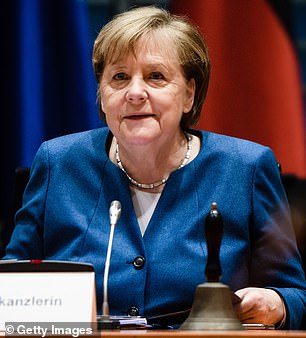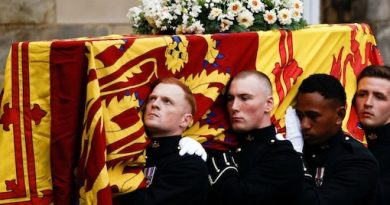Angela Merkel's centre-right party elects Armin Laschet as new leader
German Chancellor Angela Merkel’s centre-right party has elected a new leader to take over ahead of the national elections in September.
Armin Laschet, the pragmatic governor of North Rhine-Westphalia, was announced the winner at a virtual conference hosted by the Christian Democratic Union party on Saturday in Berlin.
The 59-year-old is a fervent Merkel loyalist and is seen as the continuity candidate ahead of the election which will see Germans deciding on their first new chancellor in 15 years.
Merkel, 66, the longest serving head of government in the EU, was first elected chancellor in 2005 and announced two years ago that she would be stepping down at the end of her term.
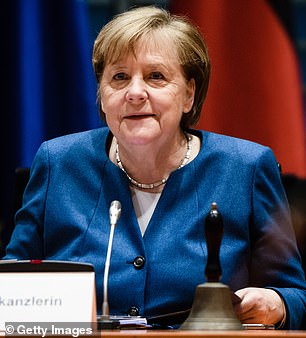
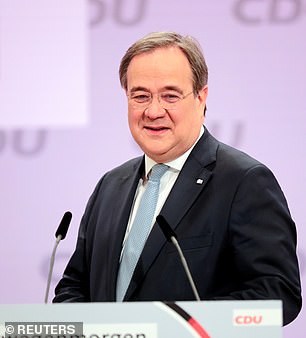
German Chancellor Angela Merkel at a cabinet meeting last week (left) and the newly elected Christian Democratic Union (CDU) party leader Armin Laschet today after his victory (right)
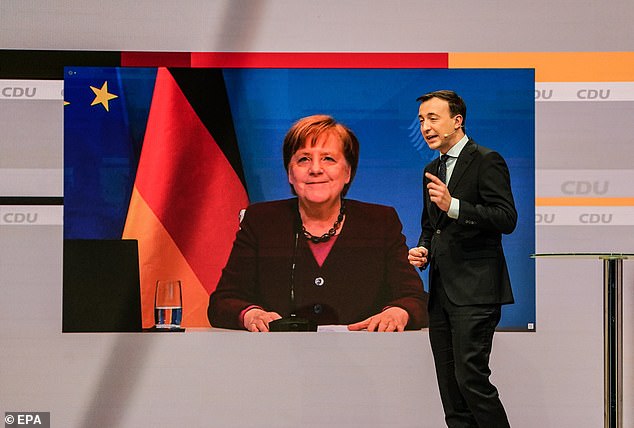
Paul Ziemiak (R), secrtaray general of the Christian Democratic Union (CDU listens to the speech of German Chancellor Angela Merkel during CDU party virtual party congress in Berlin, Germany, 15 January 2021
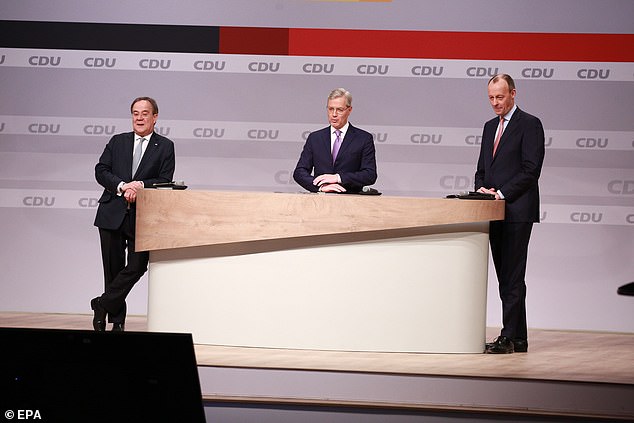
Candidates for the new CDU party chairman (R-L) Friedrich Merz, Armin Laschet and Norbert Roettgen attend a CDU virtual party congress in Berlin on Saturday
She was attending today’s conference via video call as Laschet defeated Friedrich Merz, a conservative and one-time Merkel rival, by 521 votes to 466.
The decision ends an 11-month leadership limbo in Germany’s strongest party after outgoing leader Annegret Kramp-Karrenbauer, who had failed to impose her authority on the party, announced her resignation.
Kramp-Karrenbauer took over as leader of the party two years ago while Merkel remained as chancellor.
Laschet has been handed the difficult prospect of trying to unite the party under his leadership, something which Kramp-Karrenbauer struggled with.
A soft-spoken political moderate with a reputation for pragmatism, Laschet famously stuck by Merkel in 2015 during the migrant crisis.
If anything, he is seen as even more pro-migration than Merkel, celebrating diversity as a economic and social boon to his state.
During his campaign to head the CDU, he positioned himself as the Merkel’s natural successor, telling Stern magazine that ‘a break with Angela Merkel would send exactly the wrong signal’.
On Saturday, he spoke to his fellow delegates on the value of moderation.
‘We must speak clearly but not polarise,’ he said. ‘We must be able to integrate, hold society together.’
He said that ‘we will only win if we remain strong in the middle of society.’
Laschet said that ‘there are many people who find Angela Merkel good and only after that the CDU. He added that ‘we need this trust now as a party’ and that ‘we must work for this trust.’
Laschet emerged as an early favourite when the race to head the party was thrown open last year after the surprise resignation of Kramp-Karrenbauer.
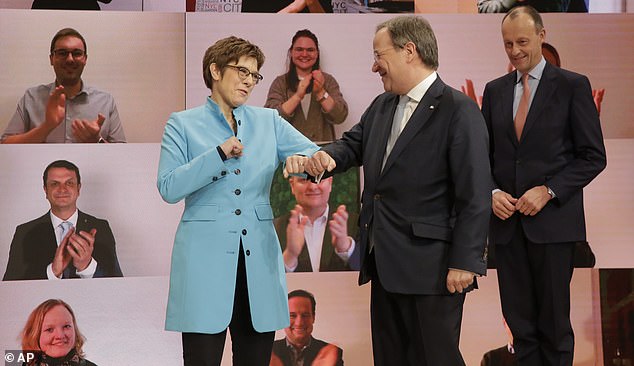
The new elected Christian Democratic Union, CDU, party chairman Armin Laschet, centre, greets by outgoing chairwoman Annegret Kramp-Karrenbauer, left, after the voting at a digital party convention in Berlin
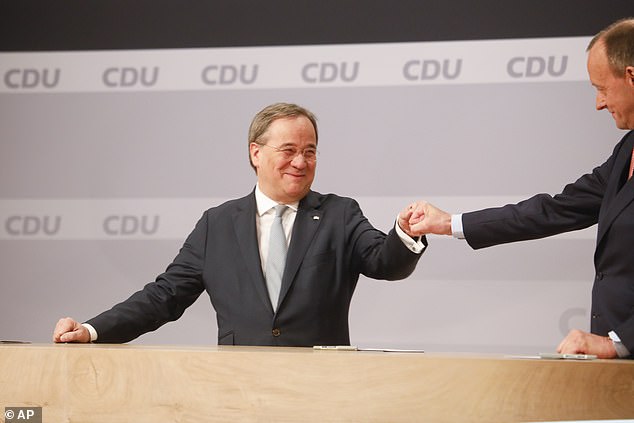
Laschet, left, fist bumps his rival candidate Friedrich Merz during the final vote count today
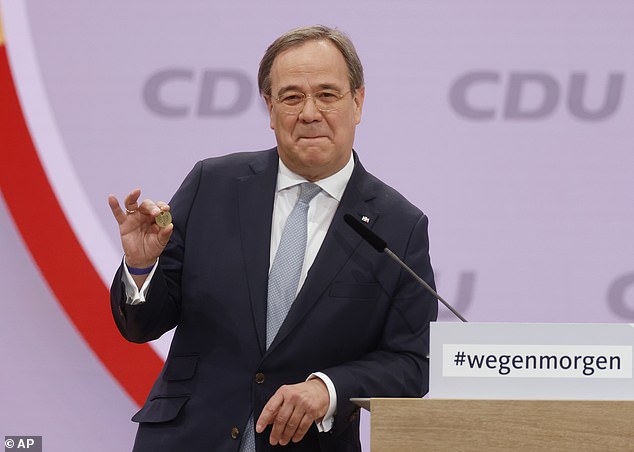
Laschet shows off a lucky coin offered to him by his father as he delivers his speech on Saturday
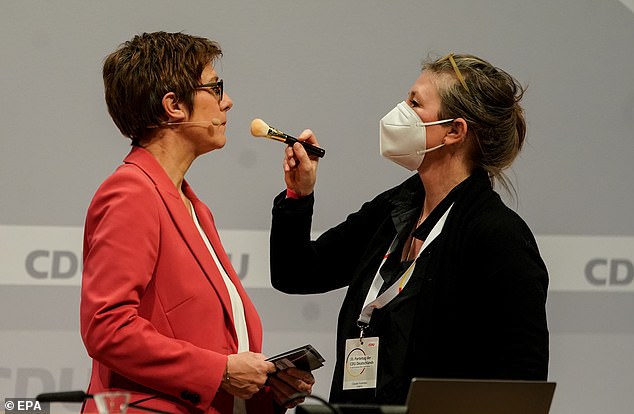
Christian Democratic Union (CDU) party leader Annegret Kramp-Karrenbauer gets a final touch of make-up before going out to speak to the party conference in Berlin
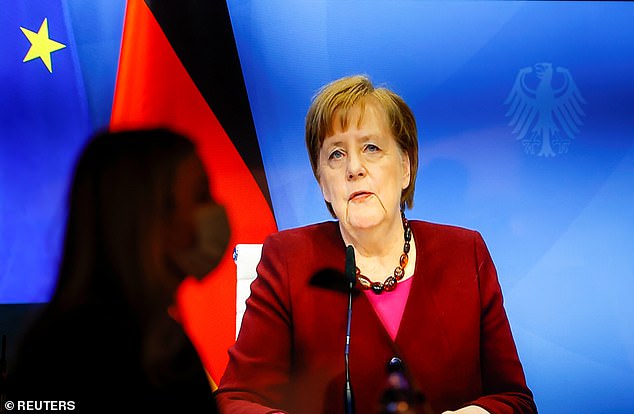
A Christian Democratic Union (CDU) party member watches German Chancellor Angela Merkel delivering a speech on a screen
But his path to the top was anything but smooth, with critics accusing him of flip-flopping and poor leadership over his handling of the pandemic in North Rhine-Westphalia.
In the spring, Laschet pushed aggressively for the loosening of restrictions to curb the spread of the virus – only to backtrack after a huge outbreak at a slaughterhouse.
He also sparked a row when he appeared to blame eastern Europeans for importing new coronavirus cases to Germany.
While he has been praised for his ability to unify, he is also seen as ‘indecisive, sometimes acting impulsively’, according to the daily Sueddeutsche Zeitung.
But Laschet was boosted by a strong performance for the CDU in local elections in North Rhine-Westphalia in September, hailing the result as an endorsement of the party’s ‘moderate course’.
In a recent interview with the Bild daily, he highlighted his experience as a state premier as a reason for CDU delegates to vote for him.
‘It also doesn’t hurt to have won an election before. And it is important to be able to bring people together,’ he said.
CDU members may also have been swayed by Laschet’s alliance with Health Minister Jens Spahn, whose efforts to steer Germany through the pandemic have made him a favourite with the public.
The pair wrote a joint article for Der Spiegel weekly promising to make the CDU ‘one of the most modern parties in Europe’ and stressing that leadership ‘does not mean a one-man show’.
In what appeared to be an endorsement for Laschet, Merkel on the eve of the vote called for a moderate leader for the party and said she wished for a ‘team’ to be elected.
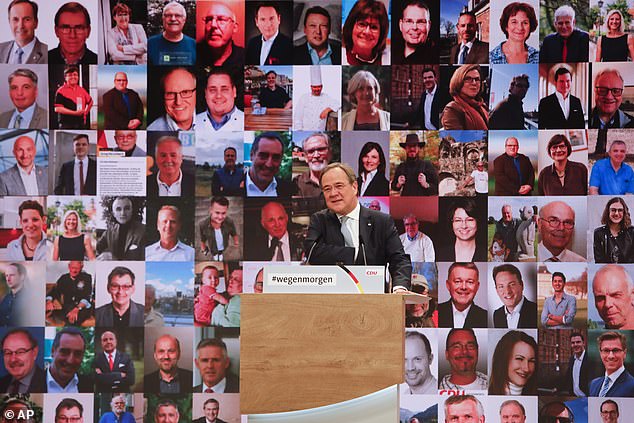
The new elected Christian Democratic Union, CDU, party chairman Armin Laschet speaks after the voting at a digital party convention in Berlin
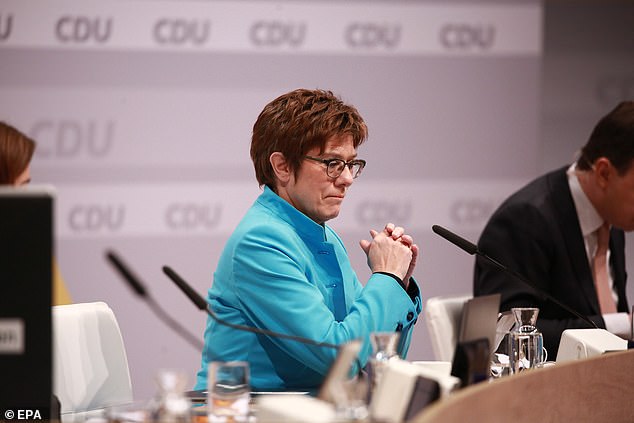
Outgoing Christian Democratic Union (CDU) party leader Annegret Kramp-Karrenbauer attends the CDU virtual party congress in Berlin
Laschet was born in Aachen, the spa city in western Germany near the border with Belgium and the Netherlands.
He is a great fan of Charlemagne, the king of the Franks credited with uniting Europe whose empire was based in Aachen. His family has even claimed they are direct descendants.
But playing up his everyday man image, Laschet underlined in a speech before the vote that his father worked in a mine and taught him that ‘when you’re down in the mine, it doesn’t matter where your colleague comes from, what his religion is or what he looks like. What is important is, can you rely on him.’
His wife is of French-speaking Wallonian origin and he speaks fluent French. The pair have three children.
Laschet studied law and political science in Munich and Bonn before working as a journalist for Bavarian radio stations and television, and as the editor of a Catholic newspaper.
The self-described ‘passionate European’ was elected to the Bundestag in 1994 and to the European Parliament in 1999.
He became head of the CDU in the state in 2012 and has been state premier since 2017.

